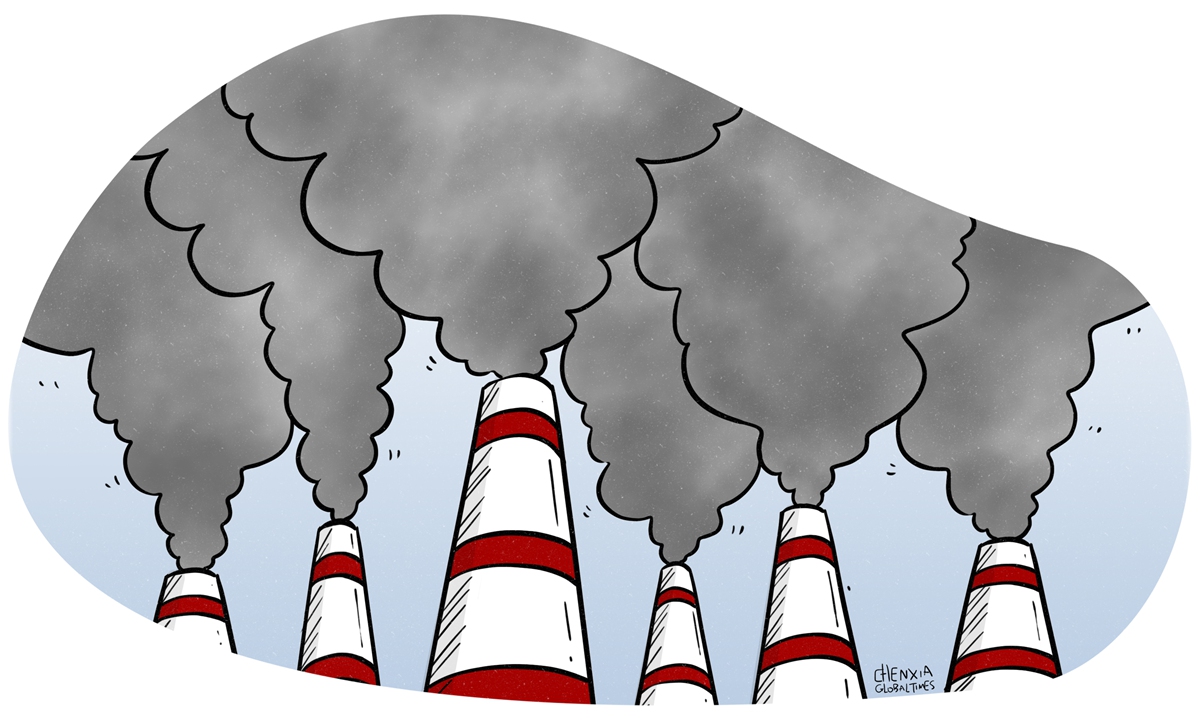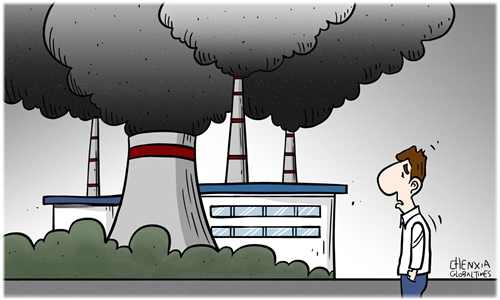
Illustration: Chen Xia/Global Times
Across the globe, scorching days are getting hotter and increasingly more frequent. Hundreds of millions of people in the world are currently experiencing sweltering and also dangerous heat waves - an unpleasant new reality as the effects of global warming and climate change continue to manifest in extreme weather patterns that harm us.Although heat waves are highly likely to become more intense and more durable, there isn't a well-coordinated international effort to cope with climate change yet. The world's major power, the US, is not putting required resources in place to ramp up green growth, but stubbornly insist on forming exclusive political, military and technology groups to squeeze its imagined rivals, which has made the world more divided and fragmental.
Due to a natural gas and oil supply crunch caused by the geopolitical frictions, many European countries are now returning to coal-fired power stations and even stoves. And, the US' Biden administration has backtracked on its earlier election promise to reduce the country's carbon footprint. These backflips will increase greenhouse gas emissions into the atmosphere, and make our living planet warmer and less inhabitable.
Unfortunately, Earth's climate is now slipping into "unchartered territory." Until now, our planet's average temperature has already grown by 1.1 degrees Celsius compared to the pre-industrial era, as a consequence of the emissions from fossil-fuel fired power plants, gasoline-powered vehicles and industries.
If carbon dioxide and other greenhouse gas emissions are not curtailed, significantly and promptly, daily high and low temperatures are estimated to rise by at least 1.2 to 1.5 degrees Celsius in most areas by mid-century. It's possible that summer temperatures in some quarters on Earth may surge to as high as 50 degrees Celsius, or 122 degrees Fahrenheit, by the end of this century, scientists and meteorologists have warned.
In July, Britain was pummeled by a heat wave with temperatures setting a new record of 40 degrees Celsius, or about 104 degrees Fahrenheit, which is 30 degrees hotter than typical summer temperatures in a country where less than 5 percent of homes have air conditioning. Hot air-masses also blanketed Spain, Portugal, France, India, the Mideast and a large swath of North America in the past four to five weeks.
Entering summer, China was also hit by intense and prolonged heat waves. Over the past 20 days, the country's national meteorological authority incessantly issued yellow alerts for elevated temperatures as heat waves swept across East China's Jiangsu, Shanghai, Jiangxi and Anhui, Central China's Hunan and Hubei, and North China's Beijing,Tianjin and Hebei, with parts of southwestern Sichuan and Chongqing reporting temperatures of more than 40 degrees Celsius.
Heat waves are more dangerous when combined with high humidity, as people in Beijing and Shanghai experienced last week. Normally, human body can cool itself through sweating, but when humidity is high, sweat cannot evaporate as quickly, which could lead to heat stroke and other health problems, especially for those who lack access to cooling, which are often people on low incomes.
Extreme heat is one of the leading causes of weather-related deaths in the world. Elderly people, infants and children, outdoor workers and people with chronic health conditions are most vulnerable to heat waves. More than 2,000 were estimated to have perished to extreme heat stress in Europe this summer, with Spain, Portugal and Britain bearing the brunt of the heat hit.
In 2021, the unprecedented Western North America Heat Wave assaulted California, Nevada, Oregon and Washington states in the US and Canada's British Columbia in July, with the highest temperature recording 49.6 degrees Celsius at Lytton, Canada. More than 1,400 people died in the "apocalypse," which scientists claimed was highly unlikely in the absence of anthropogenic climate change.
The predictions scientists have been making for decades about what awaited our planet should the temperatures continue to spiral up are increasingly coming into fruition now, in the form of these dreadful heat waves and other extreme weather patterns. For example, the torrential rainstorm battered Zhengzhou, capital of Henan Province, Central China, inundating the city in just two hours with more than 380 people killed.
The biggest cause for concern is not that these episodes of extreme weather patterns confirm the existential threat of climate change, but rather that what is to come could be more alarming and troubling.
But, many governments have been deaf to or just ignore the wake-up call. While some developed countries are turning back to coal and emitting more greenhouse gases, they are hypocritically instructing developing countries to shoulder more responsibility than they should. In the US, July has dealt a serious blow to the green plans of the Biden government, with a Supreme Court ruling that has severely limited the American president's ability to make any progress on that front. All indications signal that politicians in Washington are just paying lip service to curbing climate change as the two political parties there are always engaged in partisan fight, while trying to maintain American global dominance and hegemony through containing the rise of China and other countries.
In late July, the UN's secretary general, Antonio Guterres, described the lack of government actions on climate change as "collective suicide." In the most pessimistic scenario predicted by scientists, in which our planet warms by more than 4 degrees Celsius, an individual who was born in 2010, when turning 70, will experience 25 more days a year above 40 degrees Celsius - a true nightmare for living things on our planet.
There is still a window to reduce global warming, which needs the collective effort of all the countries, the world's leading economies in particular, to ramp up our campaign to drastically cut greenhouse gas emissions, and start to phase in more green energies by building facilities of hydropower, solar panels, wind turbines as well as nuclear power plants, while manufacturing more electric trucks, buses and cars. With regard to developing and using new and clean energies, China has in the past years made marked progress.
The Earth needs our concerted efforts to reduce carbon emissions, because our offspring cannot live in a much hotter and more perilous planet.
The author is an editor with the Global Times. bizopinion@globaltimes.com.cn



